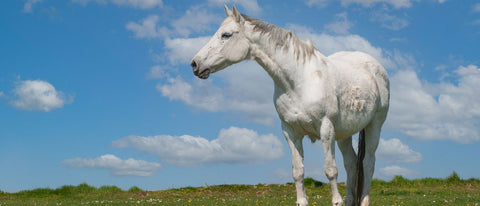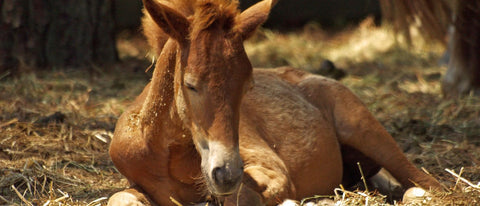
Florian ist aufgewachsen auf einem Bauernhof. Umgeben von Pferden, entdeckte er früh seine Faszination für diese majestätischen Tiere. Inspiriert von seiner reitbegeisterten Mutter, entwickelte er das Nahrungsergänzungmittel - Pferdegold. Seine tiefe Verbundenheit zur Natur und die leidenschaftliche Hingabe zu Pferden trieben ihn an, sein Unternehmen zu gründen.
Arabian horses are not only one of the oldest but also one of the noblest horse breeds in the world. Their elegance, intelligence, and endurance make them a favorite among many riders and horse lovers.
Although they are often portrayed in films as temperamental and boisterous, Arabian horses are actually very people-oriented, sensitive and reliable when kept and trained properly.
In this guide, you will learn everything you need to know about the Arabian horse, from its impressive profile to its diverse character and fascinating origins.

Profile: These are the special characteristics of an Arabian horse
Arabian horses are known for their unique anatomy, impressive endurance, and diverse talents.
They have an elegant appearance, characterized by a fine head, large eyes and nostrils, small ears, and often a "pike head." This means that the head has a typical, concave nose profile .
The Arabian horse's height is between 140 and 156 cm , and the weight of a purebred Arabian horse varies between 420 and 560 kg . Their coats can be any color, although grey is particularly common in Arabian horses.
But foxes, browns and blacks are also not uncommon.
The diversity of nature and character of the oldest horses in the world
The character of Arabian horses is characterized by
- Sensitivity,
- People-oriented,
- Temperament,
- performance,
- Intelligence,
- Endurance and
- Curiosity.
Although they sometimes have a reputation for being nervous and skittish, Arabian horses are generally very friendly, gentle, and reliable . Their exceptional endurance and high intelligence also make them ideal endurance horses and reliable sports partners in many disciplines.

Pferdegold® Skin & Coat
The Pferdegold Skin and Coat dietary supplement provides your horse with all the essential nutrients to support the regeneration of hooves, coat, and skin, making it easier for your horse to get through the shedding period. A balanced supply of nutrients can help support your horse's daily diet.
Order nowPhysical characteristics: shape and structure
Arabian horses are often described as the most beautiful horses in the world . They have a very elegant appearance, are slender, and have a small, pike-shaped head with a slightly inward-curved nose, giving them a particularly graceful aesthetic .
Their large eyes and nostrils, as well as small ears, give their head a distinctive appearance . The head extends into a long, rather narrow neck, which ends in a strongly pronounced withers.
The tail is set high and is carried upwards, especially when excited. These features contribute to its compact and graceful appearance .
What talents do Arabian horses have?
Arabian horses are known for their great endurance and their suitability as endurance horses . They are considered the fastest horses in the world over long distances.
However, their high intelligence and curious nature also make them suitable for many other disciplines, and they also perform well in dressage, for example.
What tasks are the horses used for?
Arabian horses are versatile : They excel in leisure and show riding, and even in dressage . Their sensitivity and strong bond with people also make them ideal partners for recreational riders.
At the same time, their endurance and performance enable outstanding performances in endurance riding . They are also very popular in films, as their distinctive appearance and fighting spirit make them impressive actors.

How old do Arabian horses get?
The average life expectancy of an Arabian horse is between 25 and 30 years . However, with proper care , sufficient exercise, and training tailored to the specific needs of the breed, they can live to be 40 years old or older . It is crucial to keep and train horses appropriately for their abilities and needs to ensure their health and well-being for many years to come.
The origin and history of Arabian horses at a glance
Arabian horses originate from the Arabian Peninsula and are one of the oldest horse breeds in the world. They were bred by the Bedouins as early as the 7th century and have influenced many other horse breeds over time. Their special characteristics, such as endurance, intelligence, and elegant conformation, made them sought-after animals for breeding and riding. Today, Arabian horses are found worldwide and are bred in Europe, North America, the Middle East, Africa, and Turkey .
Our product recommendation
The correct posture: This should be taken into account
✔ Sensitivity and connection with people: Arabian horses are very sensitive and have a strong connection with people. Therefore, it is important to build a close bond with them and treat them with respect and understanding.
✔ Exercise and activity: They need sufficient exercise and breed-specific activity to stay healthy and happy.
✔ Species-appropriate husbandry: Species-appropriate husbandry, a balanced diet and regular training are crucial for the well-being of an Arabian horse.
✔ Individual needs: It is important to address the individual needs of each horse and create a stress-free environment.
✔ Socialization and training: Good socialization with other horses and positive, respectful training are also key factors for successful ownership.
Are Arabian horses prone to disease?
Arabian horses are generally robust and healthy , but like all horse breeds, they can suffer from certain diseases. A common condition in Arabians, for example, is depigmentation.
It is important to have horses examined by a veterinarian regularly and to ensure they have a balanced diet and sufficient exercise to prevent disease.

Depigmentation of skin and fur
Depigmentation of the skin and coat is a condition in which Arabian horses lose their coat color and their skin color. This can lead to skin problems and a dull coat . Targeted nutritional support can be one way to strengthen the skin and coat.
Pferdegold® Skin & Coat supports your horse with zinc. Pferdegold Skin & Coat pellets were developed to combat nutritional deficiencies and support the skin and coat with targeted nutrient supply.
You can find more information about this product and our customers' opinions on the product at Pferdegold® Haut & Fell.

Pferdegold® Skin & Coat
The Pferdegold Skin and Coat dietary supplement provides your horse with all the essential nutrients to support the regeneration of hooves, coat, and skin, making it easier for your horse to get through the shedding period. A balanced supply of nutrients can help support your horse's daily diet.
Order now3 interesting facts about Arabian horses
Arabian horses are known not only for their beauty and endurance, but also for a number of unique characteristics and interesting facts that distinguish them from other horse breeds.
1. The record for the oldest racehorse goes to an Arabian
Arabians are known for their longevity , but one Arabian stallion has managed to exceed all expectations by setting the record for the oldest racehorse. Al Jabal, a purebred Arabian, won a race at the impressive racehorse age of 19, a feat even recorded in the Guinness Book of Records. This underscores the remarkable endurance and vitality of this horse breed .
2. The horses are very famous both in films and in breeding
Arabian horses are not only highly valued for breeding, but also very popular in the film industry . Their elegant appearance and charismatic demeanor make them the stars of many famous films.
For example, the Arabian stallion " Jingo " played the role of the legendary founding father of the Arabian breed, the Godolphin Arabian, in the film " The Winds of Time ." An Arabian named Cass Ole also played the lead role in "The Black Stallion ," a 1979 film.
3. Unlike other horse breeds, Arabian horses have only 17 instead of 18 ribs
A unique characteristic of Arabian horses is their anatomy. Unlike most other horse breeds, Arabians have only 17 ribs instead of 18 and only 5 lumbar vertebrae instead of 6. While most horses also have 16 to 18 tail vertebrae , Arabian horses have exactly 15 tail vertebrae , which contributes to their compact and elegant appearance.

Arabian horse: The different bloodlines
Arabians, or more specifically, purebred Arabians, are divided into different bloodlines, each with its own unique characteristics and traits.
Each bloodline has its own history and produces different offspring.
-
Egyptian Arabian: This bloodline has been bred for 1,800 years and traces its origins back to the horses of the Bedouins. Egyptian Arabians are generally shorter at the withers and have a more distinctive head than horses of other bloodlines.
-
Polish Arabian: Breeding of this bloodline began in 1817 and produces highly popular and charismatic offspring. Polish Arabians are divided into further subtypes.
-
Russian Arabian: Russia began breeding these horses with strong character in the 17th century. They usually have particularly ground-covering movements and a strong foundation.
-
Spanish Arabian: The Spanish Arabian horse has its roots in the 19th century, when the Spanish royal family began importing Arabian horses from the Middle East. They are known for their endurance and exceptional elegance.
- Crabbet: Purebred Arabians of the Crabbet bloodline are now rare. Even this line produces more powerful Arabians than usual.
Attention: Even if the Shagya Arabians Bearing the name "Arabian," this is a distinct breed, primarily based on purebred Arabians. By crossing Arabian stallions with selected mares of European breeds, the Shagya Arabian was bred to create a versatile riding horse.
Meaning of the name: This is what lies behind the name
The name " Arabian " is derived from the Arabian Peninsula, the area of origin of this horse breed . It is a direct reference to its origins and its long history, which is closely linked to Bedouin culture and tradition.
These nomadic peoples have influenced and perfected the breeding of Arabian horses over the centuries. The name Arabian thus stands not only for a horse breed, but also for a rich tradition and culture that lives on in these beautiful animals to this day.

Pferdegold® Skin & Coat
The Pferdegold Skin and Coat dietary supplement provides your horse with all the essential nutrients to support the regeneration of hooves, coat, and skin, making it easier for your horse to get through the shedding period. A balanced supply of nutrients can help support your horse's daily diet.
Order nowConclusion
Arabian horses are a fascinating and versatile breed with a rich history and impressive characteristics. Their elegance, intelligence, and endurance make them a popular partner for both sport and leisure.
However, proper housing and care are crucial to ensuring the well-being of these special animals. At Pferdegold, we do everything we can to help you support your horse's well-being in the best possible way.
FAQ
What is the most expensive horse breed in the world?
The most expensive horse breed in the world is not clearly defined, as the value of a horse depends on many factors, including its lineage, training, and skills.
However, Arabian horses are among the most expensive horse breeds in the world because they are highly valued for their beauty, intelligence and versatility.
How much does an Arab cost?
The horses usually cost between €5,000 and €15,000, although higher prices can occur depending on their pedigree.
When can you break in Arabians?
Arabians can usually be broken in at the age of 3 to 4. However, it's important to consider the individuality of each horse, as some may not be physically or mentally ready. An experienced trainer can help determine when a horse is ready to be broken in.
How do you care for the coat of an Arabian horse?
Caring for an Arabian horse's coat is similar to that of other horse breeds. Regular brushing helps remove dirt and loose hair and keeps the skin healthy.
It's also important to pay attention to specific problems such as skin diseases or parasites. Pferdegold Skin & Coat supports the skin and coat with zinc.
Which feed is suitable for Arabian horses?
Arabian horses require a balanced diet rich in high-quality proteins, fats, vitamins, and minerals. It is important to adapt the feed to the horse's activity level, age, and health status.
Pferdegold offers a range of products specifically designed to support the well-being of horses.
If you would like to learn more about other horse breeds, you will also find articles on our blog about:
- Fjord horses - all information about origin, attitude & character!
- Andalusian horses
- Dülmen wild horses
- Icelandic horses » All information about their appearance, character & more!
- Palominos
- Pura Raza Española
- Friesian » All facts about the horse's character, origins, etc.
- Thoroughbreds
Each horse breed has its own special characteristics and it is worth learning more about them.

















